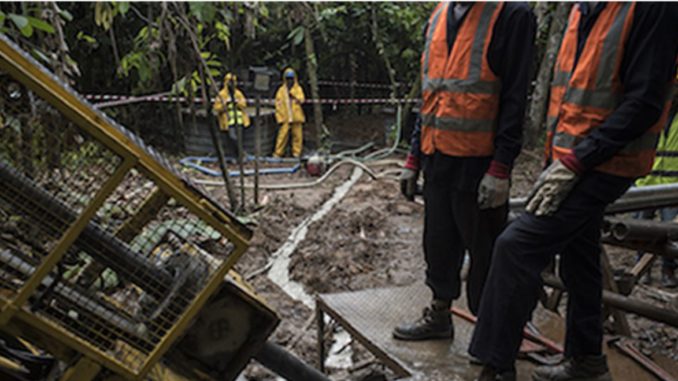
A revelation that N353 billion worth of gold smuggled out of the country was sold in the international market is another wake-up call for more responsible governance in the country. According to the Mines and Steel Development Minister, Bawa Bwari, 18 tonnes of gold were illegally taken out between 2016 and 2018, denying the government enormous revenue but generously enriching deadly rogue miners and smuggling syndicates. The federal and state governments need to restructure the mining of gold, recover it from illegal miners and bandits to enrich their depleted treasuries.
At the centre of the larceny is Zamfara State, host to large gold deposits where illegal miners, artisans and smugglers rule the roost. Though these illicit merchants are active in a few other states, it is this North-West state that epitomises the gold mining crisis in the country: over 500 children died from lead poisoning arising from artisanal gold mining in 2010, while bandits rustling cattle and targeting mining sites have rendered parts of the state ungovernable. Gold smugglers are occasionally nabbed at the airports.
Bwari said the average six tonnes of gold taken out of the country annually had no impact on the economy or added to the Gross Domestic Product of gold-hosting states. Indeed, the impact has been negative. Apart from the health hazards associated with unregulated artisanal mining, school-age children are used at the fragile mines, according to a charity, Medicins sans Frontieres, which provided medical personnel, drugs and relief for victims of lead poisoning in Zamfara.
It is estimated that gold mining in the state alone could fetch up to $2 billion per year when properly organised. Gold is a highly valued precious metal: used as jewellery, in electronics, aerospace, defence industry, in coinage, bullion and was until recently, the primary backing for currencies. It is found primarily in Nigeria’s North-West and parts of the South West. Zamfara exemplifies the indolence of Nigeria’s states. It has not significantly taken advantage of the Federal Government’s offer to willing state governments to set up investment vehicles to apply for mining licences in partnership with investors.
Gold is an important foreign exchange earner for many countries. But many companies in the West indirectly depend on illegal mining and smuggling. A 2017 survey put annual gold production at 3,247 tonnes with China as the world’s top producer; accounting for 12 per cent of total world production in 2018, says the World Gold Council. South Africa earned $5.2 billion from gold exports in 2017, its fourth highest export. Gold was Australia’s third highest export earner in 2017, fetching $29.1 billion with all its six states mining gold and competing for global markets. Though also wracked by artisanal chaos and smuggling, gold remains Ghana’s major export from which it earned $8.35 billion in 2017.
To improve its shaky financial position, the state government should embrace the ongoing federal initiatives to reform the mining sector. The government should make good its promises on gold production as enunciated by Bwari: its planned National Gold Purchase Scheme envisages the Central Bank of Nigeria buying locally mined gold to instil transparency, stimulate regulated production, check smuggling, create jobs and ensure that government derives full benefit from mining activities and trade. Zamfara, Kebbi, Niger, Kaduna and Osun states are to benefit from a direct intervention for registered artisans, while an accompanying Private Sector Window will lease equipment to small scale miners to be rounded off by a CBN gold reserve scheme.
The Zamfara State Government should take up the challenge by seizing on the federal offer for licensing; the envisaged creation of 110,000 artisanal jobs and the 250,000 others in the gold supply chain present an opportunity to reap revenue, mop up jobless youths and reclaim the state from criminals. The admission of the state’s Commissioner for the Environment, Moukhtar Lugga, that mining lease holders were not engaged in full mining activities suggests that unutilised or abused leases be revoked as reports said these licensees sub-let leases to others who neither paid taxes nor were registered.
Of its total 2017 budget of N115 billion, Zamfara envisaged internally generated revenue of only N6.02 billion; only N4.77 billion was the IGR component of its N109 billion budget in 2016. This is an absurd reflection of the distorted federal system Nigeria operates, where oil revenues taken from a few states are shared inequitably by all, thereby killing any incentive to exploit other revenue sources. This is not so in other federal states. According to Mining Intelligence, a consultancy, Canada’s provinces rely on mining and compete for investments; Ontario has the most mining projects with 1,195 active ones, followed by Quebec, British Columbia and Saskatchewan.
Governor Abdulaziz Yari should demonstrate the acumen to map out policies to reap from its gold deposits. He should map out policies to make the state friendly for investors; as the federal troops continue to clear the state of bandits, efforts should be stepped up to lure investors, taking advantage of federal initiatives.
State governors should stop relying on oil revenues, but pursue a programme of self-reliance. Kebbi and Ebonyi are pointing the way forward: Kebbi reportedly generated N150 billion from rice production in 2017, while Ebonyi targets N48 billion annually from the commodity.
Ultimately, Nigeria should face the reality of its unworkable federalism. In 2012 before he became governor, Nasir el-Rufai described Nigeria as “a federation without federalism.” He said: “… there is no incentive for the states to impose and collect income and other taxes, scout for mineral resources in their domain and make efforts for the exploration of same, and develop their agricultural potential.” Allowing individuals to reap from this precious metal at the expense of the state should no longer be tolerated. The Zamfara government should pursue reforms with zeal and urgency.
END

Be the first to comment